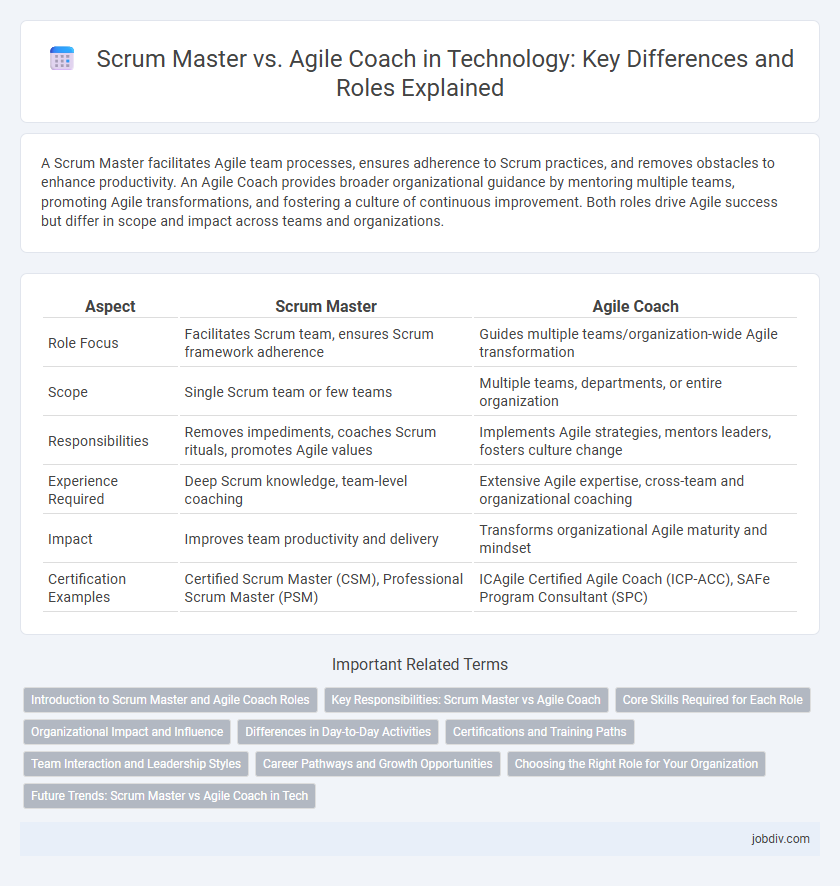A Scrum Master facilitates Agile team processes, ensures adherence to Scrum practices, and removes obstacles to enhance productivity. An Agile Coach provides broader organizational guidance by mentoring multiple teams, promoting Agile transformations, and fostering a culture of continuous improvement. Both roles drive Agile success but differ in scope and impact across teams and organizations.
Table of Comparison
| Aspect | Scrum Master | Agile Coach |
|---|---|---|
| Role Focus | Facilitates Scrum team, ensures Scrum framework adherence | Guides multiple teams/organization-wide Agile transformation |
| Scope | Single Scrum team or few teams | Multiple teams, departments, or entire organization |
| Responsibilities | Removes impediments, coaches Scrum rituals, promotes Agile values | Implements Agile strategies, mentors leaders, fosters culture change |
| Experience Required | Deep Scrum knowledge, team-level coaching | Extensive Agile expertise, cross-team and organizational coaching |
| Impact | Improves team productivity and delivery | Transforms organizational Agile maturity and mindset |
| Certification Examples | Certified Scrum Master (CSM), Professional Scrum Master (PSM) | ICAgile Certified Agile Coach (ICP-ACC), SAFe Program Consultant (SPC) |
Introduction to Scrum Master and Agile Coach Roles
Scrum Masters facilitate agile team processes by removing obstacles and ensuring adherence to Scrum practices, fostering collaboration and continuous improvement. Agile Coaches guide organizations in scaling agile methodologies, mentoring multiple teams and leadership on agile principles for broader cultural transformation. Both roles are essential for successful agile adoption but differ in scope, with Scrum Masters focusing on team-level execution and Agile Coaches driving enterprise-wide agility.
Key Responsibilities: Scrum Master vs Agile Coach
Scrum Masters facilitate daily Scrum events, remove impediments, and ensure team adherence to Agile practices to optimize sprint outcomes. Agile Coaches provide strategic guidance across multiple teams, mentor Scrum Masters, and foster organizational Agile transformation by promoting an Agile mindset and culture. Both roles drive Agile adoption, but Scrum Masters focus on team-level execution while Agile Coaches operate at broader organizational and leadership levels.
Core Skills Required for Each Role
Scrum Masters require strong facilitation, conflict resolution, and servant leadership skills to guide Agile teams through Scrum ceremonies and remove impediments. Agile Coaches need advanced mentoring, organizational change management, and deep Agile framework expertise to drive Agile maturity across multiple teams and departments. Both roles emphasize communication and collaboration but differ in scope, with Scrum Masters focusing on team-level execution and Agile Coaches on enterprise-wide Agile adoption.
Organizational Impact and Influence
A Scrum Master drives team-level improvements by facilitating Agile ceremonies, removing impediments, and promoting Scrum practices, which accelerates project delivery and enhances team collaboration. An Agile Coach operates at an organizational level, expanding Agile adoption beyond individual teams, influencing leadership, and shaping cultural change to foster agility throughout the company. The combined impact of both roles elevates organizational agility, improves responsiveness to market changes, and sustains continuous improvement across multiple departments.
Differences in Day-to-Day Activities
Scrum Masters primarily facilitate Scrum ceremonies, remove team impediments, and ensure adherence to Scrum practices, focusing on the development team's daily progress and collaboration. Agile Coaches work across multiple teams or the entire organization, guiding agile transformations, mentoring leadership, and fostering a culture of continuous improvement beyond just Scrum frameworks. The Scrum Master's activities are more tactical and team-focused, while Agile Coaches operate at a strategic level influencing organizational agility and change management.
Certifications and Training Paths
Scrum Masters typically pursue certifications such as Certified ScrumMaster (CSM) or Professional Scrum Master (PSM) to validate their skills in facilitating Scrum teams and processes. Agile Coaches often obtain advanced credentials like ICAgile Certified Agile Coach (ICP-ACC) or Certified Agile Coach (ICP-CAT), focusing on broader agile transformations and coaching techniques. Training paths for Scrum Masters prioritize team-level agility and Scrum framework mastery, while Agile Coach programs emphasize organizational change management and leadership development in agile environments.
Team Interaction and Leadership Styles
Scrum Masters facilitate team collaboration by ensuring adherence to Agile practices and removing impediments, emphasizing servant leadership that supports self-organization and continuous improvement. Agile Coaches adopt a broader leadership style, mentoring multiple teams and stakeholders to embed Agile principles across the organization, focusing on cultural transformation and strategic alignment. Team interaction under Scrum Masters is more hands-on and day-to-day, whereas Agile Coaches drive systemic change through guidance, training, and organizational agility initiatives.
Career Pathways and Growth Opportunities
Scrum Masters typically begin their careers by facilitating Agile ceremonies and removing team impediments, progressing toward roles such as Senior Scrum Master or Agile Project Manager that emphasize leadership and process optimization. Agile Coaches focus on transforming organizational culture and scaling Agile practices across multiple teams, leading to advanced positions like Enterprise Agile Coach or Agile Transformation Consultant. Both pathways offer growth through continuous skill expansion in Agile frameworks, leadership, and stakeholder engagement.
Choosing the Right Role for Your Organization
Choosing the right role between Scrum Master and Agile Coach depends on your organization's maturity in agile practices and the scale of transformation needed. Scrum Masters excel in facilitating Scrum teams, ensuring sprint success through daily stand-ups, retrospectives, and backlog management. Agile Coaches provide broader guidance across multiple teams or departments, driving organizational change, culture shifts, and agile adoption at higher levels.
Future Trends: Scrum Master vs Agile Coach in Tech
The future of tech project management emphasizes a shift where Agile Coaches adopt strategic leadership roles, guiding organizational transformation beyond Scrum frameworks. Scrum Masters will continue to specialize in facilitating Agile teams with a focus on iterative delivery and continuous improvement. Emerging trends highlight Agile Coaches integrating AI-driven analytics to optimize team performance and embed Agile principles at scale across enterprises.
Scrum Master vs Agile Coach Infographic

 jobdiv.com
jobdiv.com